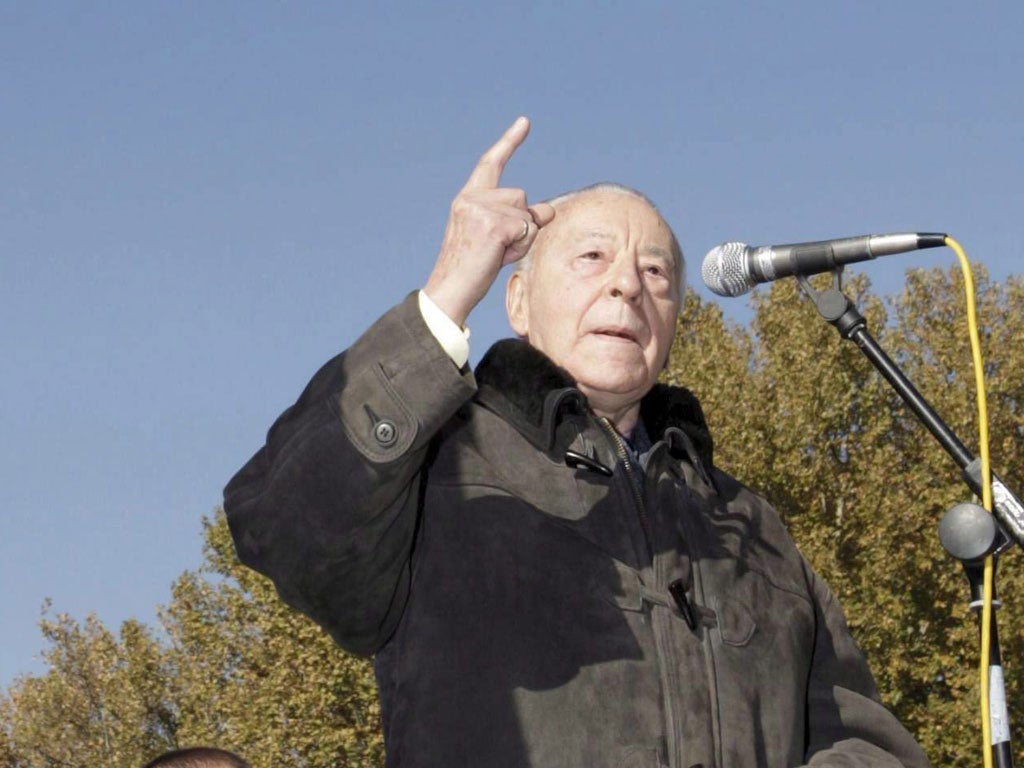Blas Piñar: Extremist who remained stubbornly loyal to the memory of Franco and strove to prevent the dilution of his legacy
Piñar was the model of a Spain we no longer know,’ wrote ‘ABC

For many years Blas Piñar was the uncrowned leader of the segment of Spain’s extreme right which remained stubbornly loyal to the fast-fading memory of General Franco. In fact, as even the right-wing daily ABC recognised in its obituary of Piñar – which ended, predictably, with the traditional Francoist “¡¡¡Arriba España!!!” – Piñar was “the [political] model of a Spain we no longer know.”
Following the death of Franco, the original Caudillo, or Leader, in 1975, Pinar’s Fuerza Nueva (FN) party briefly united Spain’s extreme right. One of the traditional chants at FN meetings and Franco memorial rallies used to be “¡Caudillo Blas Piñar!”, making it clear that for them at least, Piñar – invariably besuited, hair gelled in place and using his considerable skills as a speaker to emphasise that he was every inch the General’s man – was destined to carry on the Generalissimo’s “Crusade” (as it was called by his supporters) against the Communists, Freemasons and left-wing subversives.
Piñar was born in Toledo – his father was a pro-Franco army officer who took part in the famous defence of the Alcazar palace in the early days of the Civil War. He qualified as a lawyer in 1949 and in 1962 was appointed by Franco to be a member of the National Council of El Movimiento, the one party allowed to exist in the dictatorship, and of the Cortes, Spain’s pseudo-parliament of those years.
A hardline conservative even by Francoist standards, Piñar was a vocal opponent of legislation in the later dictatorship years aimed at increasing religious freedom for non-Catholics, and again in 1972, when it was proposed to open up trade with Franco’s old enemy, the Soviet Union. He founded the Fuerza Nueva publishing house in the mid-1960s with the aim of maintaining the original ideals of the 1936 military uprising or “Crusade”, as FN called it, principally through its weekly magazine and Piñar’s ferocious attacks on any latent liberalism in the Franco regime.
Piñar was equally aggressive towards Prime Minister’s Suarez’s pro-democratic political reforms once Franco died, calling it “a complete break with the past... and the liquidation of Franco’s work.” In the 1976 referendum that paved the way for a constitutional monarchy, Pinar spearheaded the opposition; FN’s magazine published a front cover of Franco with the headline: “He would have voted ‘No’”.
Spain voted by 97 per cent to two per cent in favour of reform, but that did not stop Piñar and his supporters assembling the following year on the anniversary of Franco’s death, 20 November, chanting “Put the Army Back in Power!” Every time the Basque terrorist group Eta killed a member of the police force or army, FN members would be at the funeral yelling anti-government, pro-military dictatorship slogans. And when the FN was formally created as a party in 1976, its official motto – “God, Country and Justice” – was an unmistakeable indication of its Francoist roots.
While FN militants in “action groups” took part in crypto-military training sessions and elements of the party were widely linked to the spate of right-wing anti-democratic violence of the late 1970s, the FN also stood in the elections they so scorned, but with scant success. In February 1977 they won no seats, then in 1979, after the pro-Franco groupings joined forces under the FN banner, Piñar was elected as the extreme right’s lone MP.
But though Piñar saw himself as carrying Franco’s legacy forward, when the one significant military uprising of Spain’s new democracy took place, on 23 February 1981, he was not one of the conspirators. Instead, along with all his fellow MPs, Piñar spent 18 hours as a hostage of Colonel Tejero’s force of Civil Guards in Spain’s Parliament. In the 1982 elections Piñar lost his seat.
Beset with debts, FN disintegrated shortly after, but Piñar continued as a reference point for Spain’s increasingly fractured extreme right, and the FN re-emerged as Frente Nacional [National Front] four years later. Piñar attempted to re-ignite “the Crusade” with a more up-to-date form of virulent ultra-conservative nationalism, squeezing out the more violent elements from his associations and even recognising Spain’s democratic constitution.
However, he had fewer and fewer followers, with a former Franco government minister, Manuel Fraga, drawing away a large segment of those nostalgic for the former regime into his Alianza Popular party, which mutated into the Partido Popular that governs Spain today.
Although retired from political activity in recent years – when he ran into his arch-enemy Santiago Carrillo, former head of Spain’s Communist Party, in a Madrid hospital in 2007, it was more a source of amusement than of concern that the two octogenarians would come to blows – Piñar continued to be an emblematic figure for Spain’s hard right. He was named honorary president of the ultra-conservative Alternativa Española (AES) party when it was created in 2003 and nominated by the AES for local elections in Toledo in 2011 – although given that he was last on their list of candidates it was a purely symbolic gesture. He also continued writing for the Fuerza Nueva publishing house, with his last article sent in for publication last Friday.
Blas Piñar: politician: born Toledo, Spain 22 November 1918; married Carmen Gutiérrez Duque (eight children); died Madrid January 28 2014.
Join our commenting forum
Join thought-provoking conversations, follow other Independent readers and see their replies
Comments
Bookmark popover
Removed from bookmarks